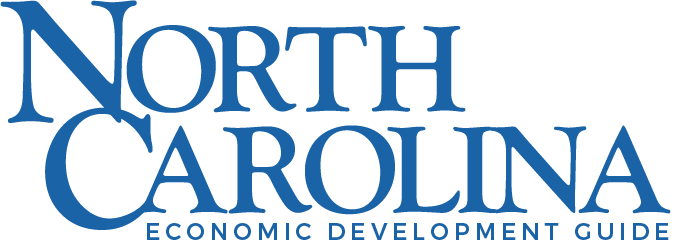Economic Development Q&A: Gene McLaurin, most valuable player
Gene McLaurin brings years of political, business and economic development experience to his new position — chairman of the Economic Development Partnership of North Carolina’s 17-member board. He shared his thoughts on the team effort that keeps the state’s award-winning business climate at the top.
Economic development is a team sport in North Carolina. From the mayor of the smallest town to the governor, local and statewide economic development organizations, and businesses themselves, everyone has a role. Gene McLaurin has played every position.
N.C. Gov. Roy Cooper named McLaurin board chairman of Economic Development Partnership of North Carolina, the public-private partnership that leads business expansion and recruitment, along with tourism promotion, last year. He has served on the board since 2017.
McLaurin is familiar with public office. He’s an eight-time mayor of Rockingham and served one term in the N.C. Senate. His district included Richmond County, where he grew up and attended Richmond Community College — part of the 58-campus system that customizes workforce training — before earning a degree at UNC Charlotte.
McLaurin has spent more than 40 years in the petroleum industry, first as Southeast division general manager at TOTAL Lubricants USA and now president of Quality Oil and Gas Co. He also is vice president of North Carolina Petroleum Marketers Association’s board.
During those four decades, North Carolina racked up economic honors. But that doesn’t mean it’s time to rest. McLaurin shared what he brings to his new role and his thoughts on North Carolina’s economy: its current state, where it’s headed and what it offers expanding and relocating businesses.
What unique experiences and abilities do you bring to your new role?
While I was a state senator in 2014, then-state Secretary of Commerce Sharon Decker asked me to support the creation of a public-private partnership to help the state be nimble and creative in its approach to economic development. Although I wasn’t in the majority party, I supported it because of my private-sector business experience and almost two decades in public service. Gov. Cooper appointed me to the EDPNC board in 2017. We have known each other for more than 20 years. We first met when he was a young legislator from Nash County and I was Rockingham’s young mayor. When EDPNC Board Chairman Frank Emory Jr. stepped down because of his increased responsibilities at Winston-Salem-based Novant Health, Gov. Cooper asked me to serve as chairman. I was excited to accept the role. I’ve seen how effective EDPNC has become and how its CEO, Chris Chung, staff and board — nine members appointed by Gov. Cooper and four each from state Senate Leader Berger and House Speaker Moore — have collaborated to improve North Carolina’s competitiveness and assisted companies statewide. I bring more than 40 years of business experience managing large international companies and smaller North Carolina-based ones. I understand the importance of the public and private sectors working together. I worked in a bipartisan way, and my voting record reflects that. Our board works in a bipartisan manner. We all want economic prosperity for our residents and communities.
What would you like to see accomplished during your tenure as chairman?
EDPNC quickly earned the respect of local economic developers, elected officials and site consultants. During 2020, the year before I became chairman, EDPNC and its local and state partners finished strong, recruiting corporate relocation and expansion projects despite the pandemic. Those wins are expected to create more than 20,000 jobs and $6.3 billion in investment. The investment total was the state’s largest in the past decade, and the jobs count was only slightly less than the decade-topping 21,675 announced in 2019. In late 2020, site consultants surveyed by Development Counsellors International ranked EDPNC as the country’s best state level economic development organization. That is a significant accomplishment for a young organization. We’re seeking to invest more in marketing the state as the best place for businesses — and workforce talent — to locate. Our peer states historically have outspent us. While North Carolina usually spends about $1 million annually on business marketing, Georgia, for example, spends $8 million to $12 million and Tennessee and Virginia $8 million to $10 million each. We expect the next state budget to fund more marketing. The legislature also has prioritized reducing regulatory burdens, simplifying the tax structure and ensuring we’re competitive with incentives. We have a tremendously attractive location for companies — domestic and foreign — but many haven’t heard that message. Our “All in North Carolina” advertising campaign has launched, and we’re ready to let more of the world know that North Carolina is a great place to do business.
How would you score the state’s current economy?
It’s very diverse with strong sectors, including food processing, banking, pharmaceuticals, information technology, automotive and aerospace. North Carolina has been one of the top three states for net migration over the past decade. We’ve seen significant growth in knowledge-based professions. The state’s engineering workforce, for example, has grown 18% to more than 45,000 employees over the past five years, which leads the nation. Investing in the workforce of tomorrow is our biggest challenge to maintaining and strengthening our economy. But it’s an opportunity, too. North Carolina’s myFutureNC initiative, for example, has set the ambitious goal of 2 million residents with a high-quality postsecondary degree or credential by 2030. State Commerce Secretary Machelle Sanders recently released First in Talent, the state’s four-year plan for economic development. Workforce investments are the key to building the most prosperous economy for our residents and our businesses. Recently, Secretary Sanders, Chris Chung and I spent a weekend with site consultants from across the country. We learned, among other things, that developing talent and promoting diversity, equity and inclusion policies are key to keeping North Carolina competitive for future jobs and investment. On the international front, EDPNC expects new recruitment opportunities as international companies seek to onshore operations, getting their products closer to the vast pool of North American buyers. Our East Coast location and strong rail, highway, ports and airports position us well to compete for those foreign-direct investments.
How can North Carolina close the economic development gap separating its rural and urban communities?
There isn’t a one-size-fits-all approach to rural community economic development. Each community’s strategy should focus on its strengths rather than duplicating efforts of urban communities. It’s a good idea to think regionally whenever possible, taking advantage of proximity to urban centers. There is great opportunity for rural communities to market their quality of life, beautiful outdoor spaces, low cost of living and lack of congestion to frustrated urban workers who are seeking small-town life. The COVID pandemic has created more remote workers. They can live anywhere they choose. But to attract them, a community needs reliable broadband internet. North Carolina and other states must bridge the digital divide between urban and rural regions. Providing equitable access to affordable and reliable broadband has been a top priority of Gov. Cooper’s administration.
How does EDPNC assist companies that are already in North Carolina?
Sometimes megaprojects, such as Apple’s $1 billion statewide investment that includes a 1 million square foot research and engineering hub in Research Triangle Park, overshadow EDPNC’s support for existing businesses. Business retention and growth are as important as recruitment. EDPNC’s existing industry expansions team provides critical services at no cost. Each of its eight regional managers interact with more than 150 businesses annually. They help manufacturers of all sizes, for example, identify hurdles then assemble local, state and federal resources to clear them. They might be workforce-development programs, state incentives, grants to upgrade equipment or renovate buildings, or expertise to implement more efficient practices. EDPNC’s international trade managers help businesses access global markets, meet vetted international distributors and find export financing. They also administer federal State Trade Expansion Program grants, which enable small exporters to attend export education workshops, exhibit at trade shows, translate marketing materials into other languages and localize their business websites in other countries. The trade team assisted more than 630 North Carolina companies in 2020, and those businesses credited EDPNC support with helping them make about $1.1 billion in export sales. EDPNC’s team of small-business advisers provide one-on-one counseling to entrepreneurs about licensing and permitting requirements of starting a business in North Carolina. The team handled nearly 25,000 cases statewide in 2020.
How does EPDNC recruit and support small businesses?
Small businesses are an important pillar of North Carolina’s economy. Secretary of State Elaine Marshall recently told me that more than 930,000 small businesses operate in the state, and they employ almost half of its workers. EDPNC recruits and supports businesses of all sizes. It helps them identify sites for location and expansion, navigate state offered incentives, and connect to public and private partners who can address infrastructure, workforce development and other needs. Each North Carolina community college has a Small Business Center to support entrepreneurs. The UNC System hosts a companion Small Business and Technology and Development Center network, which has 11 locations. The state Department of Administration has an Office for Historically Underutilized Business, which encourages growth of women- and minority- owned businesses. Often the problem isn’t assistance availability, rather it’s sorting through the options to find the best fit. EDPNC helps with that.
Where are North Carolina’s future economic opportunities?
During the pandemic, we saw strong recruitment of food and beverage processing and manufacturing, information technology, biotechnology and pharmaceutical, and warehouse and distribution businesses. We expect that to continue. We’re committed to seizing fast-developing opportunities in advanced automotive manufacturing, particularly as the world shifts to electric vehicles. North Carolina is home to several shovel-ready megasites that can accommodate large-scale automotive manufacturing. It also hosts operations of 24 of the top 100 global OEM automotive parts suppliers in North America. We have the supply chain to support automotive companies. EDPNC recently dedicated a business recruiter to growing the state’s automotive industry. And as offshore wind projects emerge along the East Coast, we’re positioned to become a key player in the wind-energy industry. The state already has a strong support system — more than 120 active suppliers — for the industry.
What’s the No. 1 reason a business should expand or relocate in North Carolina?
Our workforce. North Carolina has the Southeast’s largest manufacturing workforce — more than 475,000 employees. Our workforce is diverse. North Carolina is No. 2 in the nation for percentage of women in the technology workforce — 35.4%. Our 10 historically black colleges and universities — the second most of any state — add to that diversity. At nearly 39,000 students, North Carolina enrolls more students in HBCUs than any other state. Our community-college system system has the third-most colleges in the nation and is a model for customized workforce training. Our higher education system, which includes Tier 1 research universities Duke, University of North Carolina and N.C. State, is unparalleled. Their graduates are highly trained. Our private colleges and universities are promoting and expanding their involvement in economic development.

